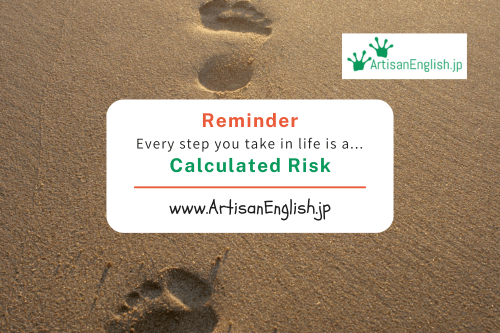
YouTube / iTunes / Spotify / Radio Public / Pocket Casts / Google Podcasts / Breaker / Overcast
Listen to ArtisanEnglish.jp posts & lesson intros here.
WotD: Calculated risk
Risk-takers are considered to be foolhardy and sometimes immature or reckless.
However, those who take calculated risks are some of the most level-headed people in business and politics you could ever hope to meet.
A calculated risk is a decision made after carefully considering the potential disadvantages and benefits.
A calculated risk is not a reckless decision.
Instead, it is a decision based on careful analysis of the situation and the available options.
Risk-takers rarely think about the outcome of what they are doing.
If they did think about it, they wouldn’t do it.
Those who take calculated risks think about the possible consequences of their actions in great detail before taking action.
For example, a company may take a calculated risk by deciding to invest in a new product line.
This type of decision involves a careful analysis of the potential risks and benefits of the project, as well as an assessment of the resources required to complete it.
American car manufacturers took a calculated risk when they fully embraced the electric car.
On the other hand, Toyota estimated the risk of putting their efforts into hydrogen-powered vehicles and, as of today, lost.
No, Toyota did not gamble.
They just bet on the vehicle market going the wrong way.
Making a calculated risk requires intense information gathering, careful research, and analysis to formulate the best understanding of the potential consequences of the decision.
However, every decision entails risk, even a calculated one.
There is always the potential for unforeseen circumstances or events that can impact the outcome of the decision.
Does anyone remember the COVID-19 pandemic?
By taking a calculated risk, individuals and businesses can make informed decisions leading to success and growth.
Flesch-Kincaid Readability Test
This post is understandable by someone with at least a 10th-grade education (age 16).
On the Flesch-Kincaid reading-ease test, this post scores 44.
The easier a passage is to read, the higher the score on a scale of 0 – 100.

